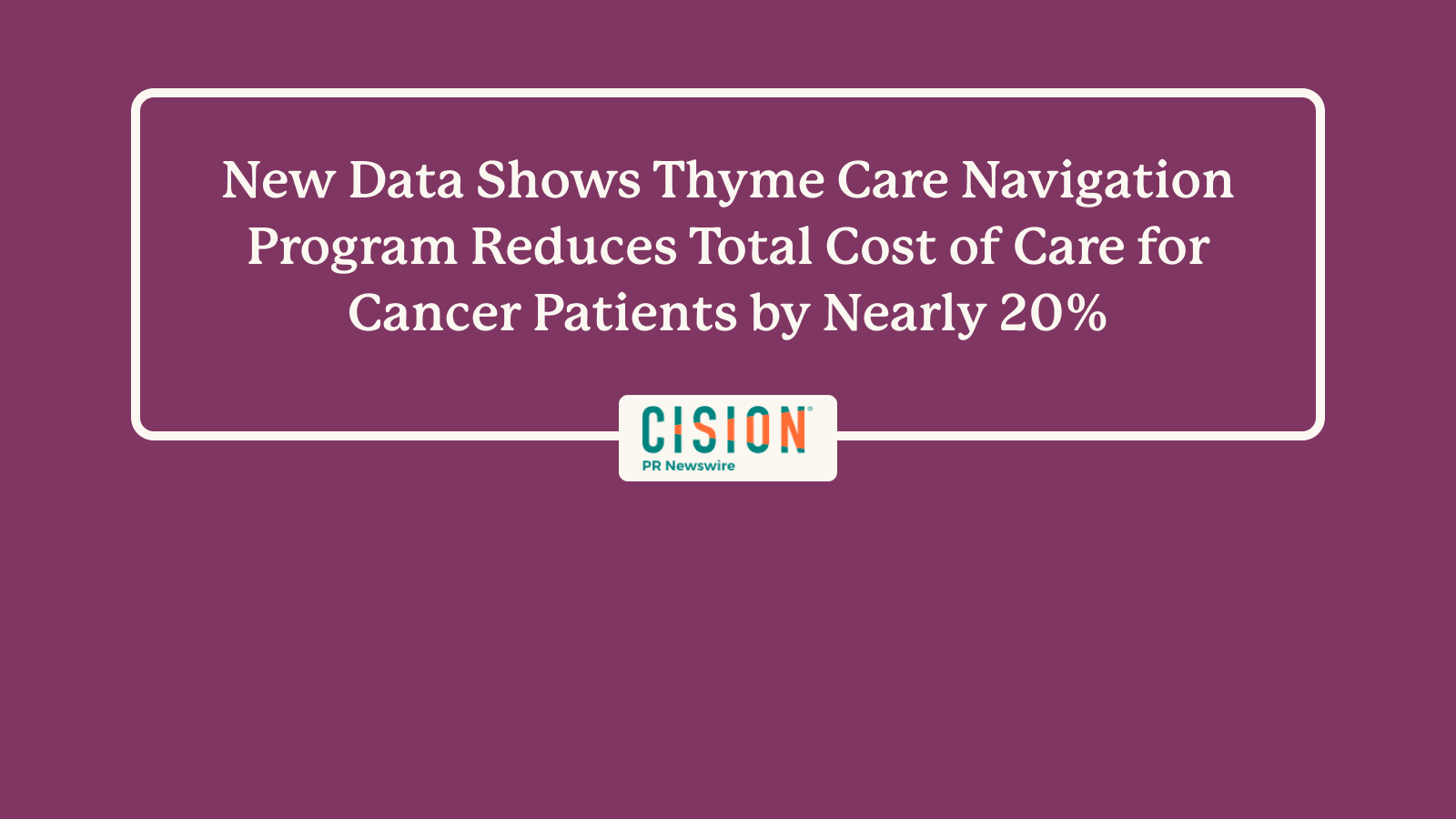Thyme Care Reduces Total Cost of Care for Cancer Patients by 20%
- In collaboration with a Medicare Advantage health plan, new study shows impacts of enhanced care coordination, proactive symptom management, and access to social services on cancer costs
- Thyme Care-navigated members experienced a more seamless care experience, resulting in reduced hospitalization costs and offering a beacon of light for payers grappling with complex, high-cost members
- Previous navigation programs have demonstrated success at the individual practice level, but scaling these interventions has proven difficult in today's fee-for-service environment; new data suggests that independent navigation programs, deployed in collaboration with payers and providers, drive significant savings as industry moves to value-based care arrangements
NASHVILLE, Tenn., Oct. 31, 2023 /PRNewswire/ -- Thyme Care, the leading value-based cancer care partner, today unveiled new research at the 2023 ASCO Quality Care Symposium highlighting significant cost savings from its comprehensive cancer care navigation and support services. In a retrospective study of patients undergoing cancer treatment, participation in Thyme Care's virtual cancer care navigation program resulted in a $594 reduction in total costs per month for navigated patients compared to a control group. This study shows that a cancer navigation program can reduce overall costs when deployed in collaboration with a health plan, and demonstrates that third-party virtual navigation can reduce overall medical costs for cancer populations.
Cancer is one of the biggest drivers of healthcare spending, costing the United States more than $200B per year. With an aging and growing population, these expenditures will only continue to compound over time. And while a new wave of therapeutic and diagnostic technologies is making its way from the bench to the clinic, the experience of cancer care remains poor, exacerbating the physical, emotional, and financial suffering of patients and families. More than 50% of cancer patients are hospitalized during their first six months of chemotherapy treatment. Although numerous studies have shown that care navigation enhances the patient experience and reduces costly and unnecessary hospitalizations, they have been largely focused within single institutions or operated by a health system. By contrast, Thyme Care's research was conducted at the health plan level, and demonstrates that an external third party navigator, operating in a virtual-only context, can drive significant savings outside of, and beyond, single-practice settings.
"This research serves as a powerful affirmation of the impactful strides we're making at Thyme Care to transform the cancer care experience and unify the oncology ecosystem," said Dr. Bobby Green, co-founder, chief medical officer, and president of Thyme Care. "It also stands as a testament to the transformative potential of an independent, virtual navigator like Thyme Care to deliver substantial savings to payers, across a diverse spectrum of healthcare providers, be it community oncology practices, academic medical centers, or other health systems."
In collaboration with a large Medicare Advantage health plan, Thyme Care launched a scalable, independent virtual care navigation program designed to reduce total cost of care for the health plan's cancer population. Enrolled members engaged with the Thyme Care Care Team, staffed by oncology nurses and lay navigators. Backed by Thyme Care's purpose built care management platform, Thyme Box, the Care Team helped address a range of clinical and non-clinical concerns that members were confronting, including:
- Symptom management beyond the clinic: Both proactive and reactive engagement with Thyme Care's oncology-trained Care Team enabled navigated members to address cancer and chemo-related side effects outside of the four walls of the clinic and reduce unnecessary hospitalizations.
- Fragmented care: By helping members navigate the complexities of the healthcare system, including gaining timely access to an oncologist, scheduling appointments, coordinating care between specialists, navigated members received enhanced care coordination that reduced the potential for gaps or barriers to care.
- Lack of access to social services: Navigated members were connected to resources related to social determinants of health, including financial assistance (49%), food insecurity (28%), and transportation access (20%), education and support services related to side effects (49%) and treatment and diagnosis (25%).
Thyme Care's proactive, patient-centric approach to cancer care was responsible for reducing total cost of care per patient by $594 PMPM relative to control participants who did not participate in the program. The majority of these savings were attributed to a $421 reduction in inpatient hospitalization-related spending. There were also statistically significant reductions in laboratory spend ($40) and radiation treatment ($110) in the navigated cohort. To compare costs, researchers used a difference-in-differences approach that compared navigated members to a control group over a three month period, matched on medium/high acuity.
"As a medical oncologist I know how important it is to deliver whole-person care beyond the clinic, in a way that is scalable and does not add undue financial or administrative burden on the patient or practice," said Dr. Samyukta Mullangi, medical oncology director at Thyme Care. "This research underscores the profound impact of independent navigators, deployed in collaboration with payers and providers, to drive remarkable health and financial returns."
Contact
Kimberly Dreisinger
Thyme Care Communications
kimberly@thymecare.com

